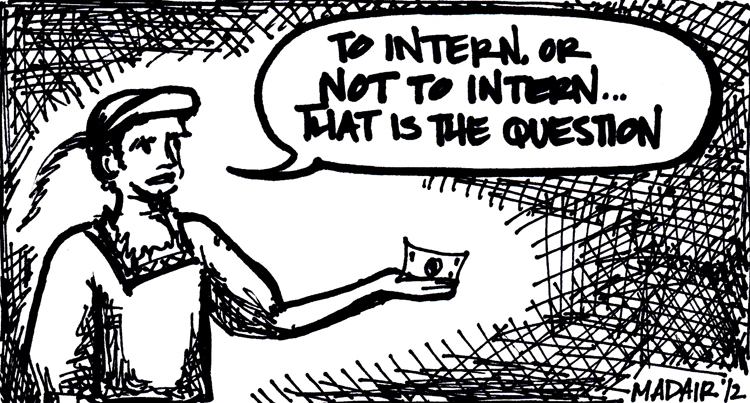Most students at the College of William and Mary have found or are looking for a valuable way to spend their summer months, whether through a job, research, community service or any one of a whole host of other options.
The one word, however, that always seems to spark stress in students still hunting for summer opportunities is “internship.” Many students seeking a way to augment their resumes to increase their chances of full-time employment after graduation are constantly looking for the opportunity to gain some experience in their chosen field.
But a paradox awaits students searching the summer job market: Potential employers want a candidate that has experience, but many employers are hesitant to grant students their first experience in a particular field. As a result, many students find themselves between a rock and a hard place. Furthermore, these employers, in many cases, will offer the chance to gain the desired experience, but only if students sacrifice earning wages in order to obtain it.
Consequently, many students are faced with a tough choice: Either forgo income now to increase full-time prospects upon graduation, or take a job that offers less relevant experience to help pay off student loans, textbooks and other college-related expenses. This particular dilemma has received a lot of debate and criticism in the media recently, especially pertaining to the legality of unpaid internships and their compatibility with labor laws.
As I deliberated what position to take, I formulated defendable arguments on both sides. Proponents of non-paid internships claim that the job market has become very competitive and companies are trying to cut back on expenses, so they must choose between offering opportunities to gain experience at no pay or eliminating these programs all together, whereby no one would benefit. On the other hand, the internship programs essentially provide companies with unpaid labor by placing students in a very competitive environment, which often leaves students with no choice but to accept no pay in order to gain experience and increase the likelihood of full-time employment later. With a glimpse of both sides of the argument, I still feel such students add value to these companies and should be compensated in some way. We invest a lot of time at the College to increase our skills in a variety of ways while often incurring large amounts of student debt, and the least companies and organizations can do is recognize that effort with compensation for internships.


You should check out my new book, ALL WORK NO PAY – all about internships and how important they are! xx Lauren Berger “The Intern Queen”
have you ever had an internship or a job before? most places are required by law to compensate you in some way. i had to be eligible to receive college credit for the internship i had this past summer. i received three credits, which is comparable to pay given the cost of tuition, and managed working a job as well. i feel like your argument is comparable to “i need a college degree to get a job, but i have to pay thousands of dollars to receive an education. should i join the workforce, accept minimal pay and avoid being in debt? or, should i pursue higher education and hope i get a good-paying job out out it?” not trying to be super critical, but internships are great.
#entitledcollegestudentsaysthingsIf you are hurting for money, work an unpaid internship and wait tables at night. Sorry you can’t go out every night of the summer because of it, but you have to pay your dues.
Most companies don’t need you as their interns, you aren’t contributing anything substantantial. They are doing it to provide young candidates experience and potentially (but not always) to enhance their recruiting efforts at a school. Take the opportunity for what it is, an opportunity. All that would happen if they required all interns to be paid is the unpaid internships would go away (they wouldn’t become paid) and those paid jobs that don’t provide experience would be harder to get.